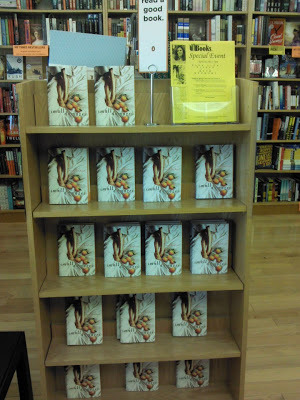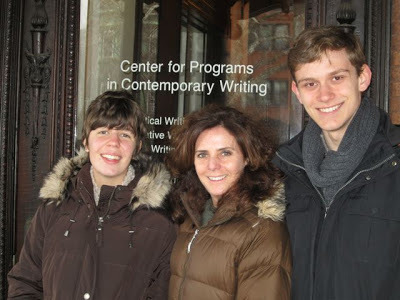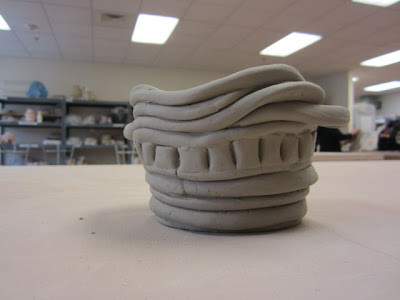Beth Kephart's Blog, page 142
February 18, 2013
a few lines from the Florence novel, for Ilie Ruby

Several days ago, my extremely talented friend Ilie Ruby invited me (along with others) to share a few lines from a work in progress. I hadn't written for many weeks. There wasn't much progress to report.
But yesterday, as I noted here, I did at last return to the Florence novel. I'm sure I'm breaking all the rules of Ilie's prompt, but here, Ilie, are some words for you:
He has risen like a ghost from the crypt,
red flowers in his arms, and he runs like he’s been running for a long time
now, like no one will ever catch him. Beneath the green arches and the
false rectangles, toward the patch of sun near the open door, through the cage
of nervous birds, the boy runs—his loose laces slapping the marble tiles and
the flowers banging around in his clutch. If he sees me, he doesn’t care.
If he thinks he’s free, he’s not, because now the monk appears from up
above, bald and thin, his robe the color of San Lorenzo brick and his belt rope
swinging in anger.




Published on February 18, 2013 04:42
February 17, 2013
I return (at very long last) to Florence

I'm not just teaching sixteen memoir makers this semester at Penn. I'm also working with the very talented Alice Ma, whom I selected from a strong field of applicants as the Bassini Writing Apprentice. Alice returns me to my novel-in-progress. We think together about what kind of research must fuel a novel like this one, what questions must be answered, and how truth becomes fiction of an engaging but authentic sort.
There's been one small problem with this arrangement. Too many consecutive twenty-hour work days have left me no time for the novel-in-progress. So there is Alice, pursuing questions. And here has been Beth, suggesting in theory.
I had promised myself and others that I would right that tilted ship this weekend, and today I honored the pledge. I had 30,000 words of the novel, banged out during a few weeks last fall. Today I printed those pages, sat beneath a blanket, and forced myself to sit and read. If there was some horrid stuff, and there was some horrid stuff, there was also a book that makes me happy. Happy to work on. Happy to pursue. Since the best part of the writing life is the writing, in my humble opinion, I better be happy to pursue.
Having spent this day righting the wrongs of my in-progress novel, I will spend tomorrow writing forward. I will be afraid, very afraid. And I will let the fear propel me.




Published on February 17, 2013 17:00
Join me for a book club dinner in Harleysville, on April 10th

This photograph made its way to me and stopped me in my tracks.
It also reminded me to let you know of this special upcoming event—the book club dinner at the Harleysville Book Store, with Small Damages appearing as the featured title. The evening event will take place on April 10, 7 o'clock, and you can register for it through the kind folks at Harleysville Books in Indian Valley, PA.
I hope to see you then. I will answer (almost) any question you ask.




Published on February 17, 2013 14:38
The Suicide Index/Joan Wickersham: Reflections

Every year we lose twice the number of parents, children, grandparents, friends, neighbors, colleagues to suicide than we lose to murder. "Murder attacks the future, suicide the past," a brilliant writer offered to me, just this week, in email. Yes.
When Joan Wickersham's father decided to end his own life early one morning—he had dressed, collected the paper, made a cup of coffee for his wife, sat down in a favorite chair, crossed his feet on the foot rest, and fired one shot. He left behind the unsolvable riddle, the countless mathematically imbalanced paradoxes that all suicides leave in their wake. For years the author tried to sort the facts and un-numb, tried to understand who her father really was and how to make the entirely unacceptable somehow acceptable, so that she could live not past it, but with it. Hadn't he loved her? How could he? Hadn't he himself been against suicide as a philosophical concept, a life choice? So then what happened? Didn't he know that taking his life in his house would make so much impossible for the wife, and was that the point, after all, and why, in the immediate aftermath, was there so much strange conversation among the family members, so many wrong things first noticed, a hint, even, of laughter?
Wickersham wrote her book in pieces. She wrote it as fiction, she wrote it as memoir hung on the hanger of chronology, and finally she wrote it as an index, The Suicide Index: Putting My father's Death in Order. The book was a National Book Award finalist in 2008. It wholly deserved the citation.
Chapter titles:
Suicide:
act of
attempt to imagine
bare-bones account
immediate aftermath
anger about
attitude toward
his,
mine,
belief that change of scene might unlock emotion concerning
You understand. You can image that Wickersham moves across pronouns, point of views, facts, assertions, incompatible parallels. You can trust that this book is honest and also unsparing—because a book about one person's suicide is also necessarily a book about the people who either did not anticipate or somehow caused (does anyone cause? can anyone anticipate?) the terrifying, tragic act.
There are lessons for memoirists in this book about structure and form. About lacerating honesty, as in: If you are going to be laceratingly honest, you must also be lacerating about yourself. About not making life too orderly for the pages of a book. Here is Wickersham, for example, offering instruction by way of notes to herself:
Biography, in the case of someone who commits suicide, is particularly dangerous, misleading. It looks at a life through the lens of a death. Every time a bad thing happens, the temptation is to say, "Aha!"
I have to be careful not to make it too orderly.
Here is Wickersham offering instructions on life:
I am convinced that in real life suicide can't be the backdrop, dwarfed by something else. It is the foreground: itself inevitably the thing that changes people's lives. There is no other plot, and no resolution. And while some healing does happen, it isn't a healing of redemption or epiphany. It's more like the absorption of a bruise.
For more thoughts on memoirs, memoir making, and prompt exercises, please visit my dedicated Handling the Truth page.




Published on February 17, 2013 06:49
February 16, 2013
Julia Hogan, Peter LaBerge, Jamie-Lee Josselyn: at home at Penn

I'm kinda tired and I'm kinda cold, but I'm not settling down on the couch beneath a blanket with my mug of warm apple cider and my memoir of the week before I post this photograph, taken at the end of a Saturday at Penn.
The highlights: Sharing the campus with my brother, sister-in-law, and super smart nephew Owen. Buying my beautiful son a quick lunch, a hot chocolate, and two party-colored pretzels. Meeting Julia Elizabeth Hogan and Peter LaBerge of National YoungArts Foundation fame for a quickish tour, a too-short conversation, and some hummus. Getting to know Julia's mom (who took this expert photo at the door to the building where I currently teach) and dad, despite the small radial arrangements in the restaurant.
And: Seeing Jamie-Lee Josselyn, associate director of recruitment and instructor in the creative writing program at Penn, at work at the Kelly Writers House. Jamie-Lee has a plan for Penn, and that plan is simply this: Let the best young writers in the world know about this university of ours, about this unique creation that is Kelly Writers House, about the gathering of word-hungry souls around the hearth. Creative, loving, persistent, Jamie-Lee crisscrosses the country, tells students the truth, and brings them to the campus for a look see. She'll even come to Manayunk on a wet day to meet the teen writers I pull together for a workshop and festival; she'll stay and chat. It's because of Jamie-Lee's efforts that I had the pleasure of seeing Julia and Peter again today. It's because of her that I have brilliant young writers entering my classroom.
To the day. To the snow that wants to fall. To the mug of cider I have earned and the book that I will read.
To continuity and friendship.
Oh, and by the way, Miss Mary Lee Adler: We did some talking about you, oh yes we did. We all love you. Hugely.




Published on February 16, 2013 13:58
celebrating a good man in corporate America: Tom Spann

I've been in this consulting business for a long time now, and I've seen plenty of things. I've seen brilliant leaders be stripped of their influence by the envy of their peers. I've seen power abused, colleagues humiliated, inconsistency masquerade as strategy, a pale hand sweep impetuously across a desk, knocking considered work to the ground. I've seen absolute assurances vanish and ego dressed up in a suit. I've seen grown men and women make grown men and women cry.
But I've seen the good guys (and women), too. I've known them, worked with them, valued them deeply. One of those good guys is a man named Tom Spann, whom I met at a company called Astra Merck. He was an Andersen/Accenture consultant with a full-time desk at the pharma company. I was a sixty-hour a week freelancer who wrote the company's news magazines, launch meeting scripts, best-practice reports, executive speeches, history book, value propositions, and most anything else that required letters, commas, question marks. When I was lucky I got to collaborate with Tom. He was a first-class sort. He asked questions; he listened. I never heard him raise his voice. Like every executive I've truly respected, his breadth of knowledge and his range of curiosity went far beyond the immediate matters at hand. He'd put forth an idea and in his quiet way ask, And if we were to move that idea forward, what would you do?
In the years since Astra Merck, Tom has gone on to build a company with his friend John Rollins. It's called Accolade, its focus is on both reducing health care costs and improving the health care experience for employees of large companies, and it has morphed from an idea discussed over coffee to a thriving mid-size company. The success of this company is no surprise to anyone who knows Tom (or John, which I also luckily do). Also ranking in the no surprise category (except that I had to find this out on my own since Tom Spann is incapable of boasting) is that, for the last two years, Tom has been named a top leader in the Philadelphia region—first in the small workplaces category and then in the midsize workplace company.
The survey asked employees to respond to this simple but overwhelmingly telling prompt: I have confidence in the leader of this organization. Then it gave the employees room to expound. Tom was reported to be accessible, caring, approachable, transparent, a man who doesn't hide in the corner office. He was known by his employees, in other words, as he is known to his friends. Think about how beautiful that is. And how frustratingly rare.
Several books ago I collaborated with Matthew Emmens, another truly decent guy, on a corporate fairytale called Zenobia: The Curious Book of Business (with illustrations by William Sulit). We created a character (named after my first Penn student, Moira) and led her through a maze of broken corporate things. She'd only survive the Alice in Wonderland madness of Zenobia if she could remain uncorrupted—if she could assert her intelligence, morality, curiosity, and perseverance, and, by example, change all that had gone wrong at this lurching, gossip-driven, demoralizing, and unnecessarily complicated company. She had (spoiler alert!) what it takes, in the end. She opened the windows, let in the light.
Tom Spann has been letting the light in his entire career long. His success is an object lesson in all that good can do.




Published on February 16, 2013 03:06
February 15, 2013
along the canal, in Lambertville, New Jersey, early this morning

Every now and then we get away, just for an evening and a morning. This morning we were here, along the canal, in Lambertville, New Jersey. A town of poets (Gerald Stern) and people who take the time to talk over coffee.




Published on February 15, 2013 14:29
February 14, 2013
at work in the pottery studio


It is good, I remind myself each Thursday morning, to set oneself upon an unnatural challenge.
Or it is good not to be sitting at my desk, typing.
Or it is good to pretend to be an artist, since I sometimes write about them.
Or it is good to enter into a community where you are unknown, and can remain unknown, stealth.
My Christmas present was a ten-week pottery course, taken in conjunction with my husband. He is, in fact, an artist, at home with multiple media, dedicated to his craft, familiar with the act of sculpting space, the go-to guy in an otherwise all-female environment. I am an artist in no media. I am ridiculously inept. I have an intimate relationship with frustration, some might say impatience.
But I try. I try to push back the panic that comes from being away from the pressures of a job that, minute by minute, spills more into the in-box. I try to roll the clay, slab the clay, texture the clay, slip and score so that pieces will remain coherent wholes. I try to fist the air away so that nothing explodes in the kiln. I try to imagine these odd shapes of mine all pimped out in color.
Last week we brought textures from the natural world to our tables. My arrangement of haphazard things infinitely prettier than the pots they are meant to adorn.
Happy Valentine's Day, my friends.




Published on February 14, 2013 04:40
February 13, 2013
on the Penn campus, with my son

I took the earlier train to Philadelphia yesterday, bounded down the stairwell, and saw, at the end of the ramp, a tall, black-haired young man, more beautiful than any—my son. We'd agreed to take a walk together ahead of my teaching hour.
And so we made our way—wove up Market, notched south, cut through the Drexel campus, and found ourselves here, above this new sports complex with its lovely panoramic view of the city. Our city. We share that now. We declare it. Our city.
Some people say my son's eyes are my eyes. Some people say it's in the brow. Some people say he writes and you write and therefore.... But I know that my kid is my kid because when we walk together anywhere we are happy. The same small things delight us. The same nothing is something. My little stories matter to him, and his matter hugely to me, and when we stop at last for lunch along 40th Street, an even greater calm settles in.
"It's such a great campus," he said, as he left me at the door of my building. "It's so clear why you love it here." He had met one of my students, said how nice he seemed. He had walked into one of my favorite Penn places, said, "Yes. It's beautiful. I see."
I see, too. But I always see better with him.




Published on February 13, 2013 06:07
February 12, 2013
The Most Beautiful Thing: a short essential film
My experience with the National YoungArts Foundation program yielded
many moments of joy, new friendships (I'll be seeing two of the young
writers this weekend at Penn!), and some encounters with astonishing
work.
This short film took my breath away, left my face wet with tears.
Written, directed, and edited by a young man named Cameron Covell,
starring Nick Lopez and Analisa Gutierrez, and already the winner of the
LACHSA 2012 Moon Dance Best Film Award and Best Actor Award, this is
what you must do in advance of Valentine's Day. You must watch this.
Thank you, Julia Elizabeth Hogan, for returning this to me. I can't wait
to see you and Peter LaBerge this weekend on my ole Ivy League campus.




Published on February 12, 2013 05:37



